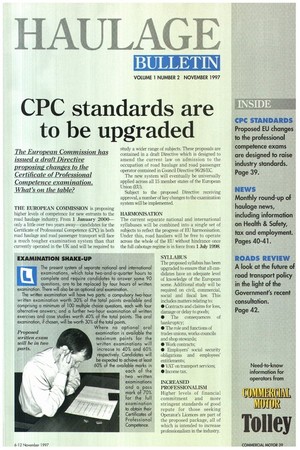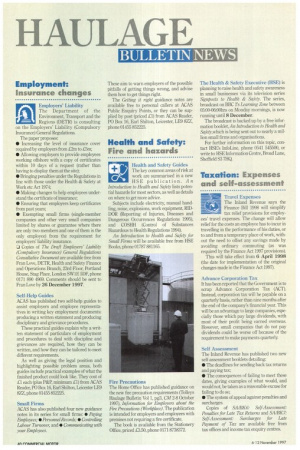HAULAGE
Page 41

Page 42

If you've noticed an error in this article please click here to report it so we can fix it.
BULLETIN
VOLUME 1 NUMBER 2 NOVEMBER 1997
CPC standards are to be upgraded
The European Commission has issued a draft Directive proposing changes to the Certificate of Professional Competence examination. What's on the table?
THE EUROPEAN COMMISSION is proposing higher levels of competence for new entrants to the road haulage industry. From 1 January 2000— only a little over two years away—candidates for the Certificate of Professional Competence (CPC) in both road haulage and road passenger transport will face a much tougher examination system than that currently operated in the UK and will he required to
study a wider range of subjects. These proposals are contained in a draft Directive which is designed to amend the current law on admission to the occupation of road haulage and road passenger operator contained in Council Directive 96/26/EC.
The new system will eventually be universally applied across all 15 member states of the European Union (EU).
Subject to the proposed Directive receiving approval, a number of key changes to the examination system will be implemented.
HARMONISATION The current separate national and international syllabuses will be combined into a single set of subjects to reflect the progress of EU harmonisation. Under this, road hauliers will be free to operate across the whole of the EU without hindrance once the full cabotage regime is in force from 1 July 1998.
SYLLABUS The proposed syllabus has been upgraded to ensure that all candidates have an adequate level of knowledge of the European scene, Additional study will be required on civil, commercial, social and fiscal law. This includes matters relating to: • Contracts and claims for loss, damage or delay to goods; • The consequences of bankruptcy; • The role and functions of trades unions, works councils and shop stewards; • Work contracts; • Employers' social security obligations and employees' entitlements; • VAT on transport services; • Income tax.
INCREASED PROFESSIONALISM Higher levels of financial commitment and more stringent standards of good repute for those seeking Operator's Licences are part of the proposed package, all of which is intended to increase professionalism in the industry. EXAMINATION SNAKE-UP The present system of separate national and international examinations, which take two-and-a-quarter hours to complete and require candidates to answer some 90 questions, ore to be replaced by four hours of written examination. There will also be an optional oral examination. The written examination will have two parts: a compulsory two-hour written examination worth 30% of the total points available and comprising a minimum of 100 multiple choice questions, each with four alternative answers; and a further two-hour examination of written exercises and case studies worth 40% of the total points. The oral examination, if chosen, will be worth 30% of the total points.
Where no optional oral examination is available the maximum points for the written examinations will increase to 40% and 60% respectively. Candidates will be expectec to achieve at least 60% of the available marks in each of the two written examinations and a pass mark of 70% for the full examination to obtain their Certificates of Professional Competence.
Employment: Insurance changes
WEmployers' Liability
The Department of the Environment, Transport and the Regions (DETR) is consulting on the Employers' Liability (Compulsory Insurance) General Regulations.
The paper proposes: • Increasing the level of insurance cover required by employers from am to £5m; • Allowing employers to provide employees working offshore with a copy of certificates within 10 days of a request (rather than having to display them at the site); • Bringing penalties under the Regulations in line with those under the Health & Safety at Work etc Act 1974; • Making changes to help employees understand the certificate of insurance; • Ensuring that employers keep certificates from past years; • Exempting small firms (single-member companies and other very small companies limited by shares or guarantee where there are only two members and one of them is the only employee) from the requirement for employers' liability insurance.
J Copies of The Draft Employers' Liability (Compulsory Insurance) General Regulations Consultative Document are available free from Fran Love, DETR, Health and Safety Finance and Operations Branch, 23rd Floor, Portland House, Stag Place, London SW1E 5DF, phone 0171 890 4969. Comments should be sent to Fran Love by 26 December 1997.
Self-Help Guides ACAS has published two self-help guides to assist employers and employee representatives in writing key employment documents: producing a written statement and producing disciplinary and grievance procedures.
These practical guides explain why a written statement of particulars of employment and procedures to deal with discipline and grievances are required, how they can be written, and how they can be tailored to meet different requirements.
As well as giving the legal position and highlighting possible problem areas, both guides include practical examples of what the finished product could look like. They cost of £1 each (plus P&P, minimum £1) from ACAS Reader, PO Box 16, Earl Shilton, Leicester LE9 87,Z, phone 01455 852225.
Small Firms ACAS has also published four new guidance notes in its series for small firms: • Paying Employees; • Personnel Records; • Controlling Labour Turnover, and • Communicating with your Employees. These aim to warn employers of the possible pitfalls of getting things wrong, and advise them how to get things right.
The Getting it right guidance notes are available free to personal milers at ACAS Public Enquiry Points, or they can be supplied by post (priced £1) from ACAS Reader, PO Box 16, Earl Shilton, Leicester, LE9 877, phone 01455 852225.




















































































































